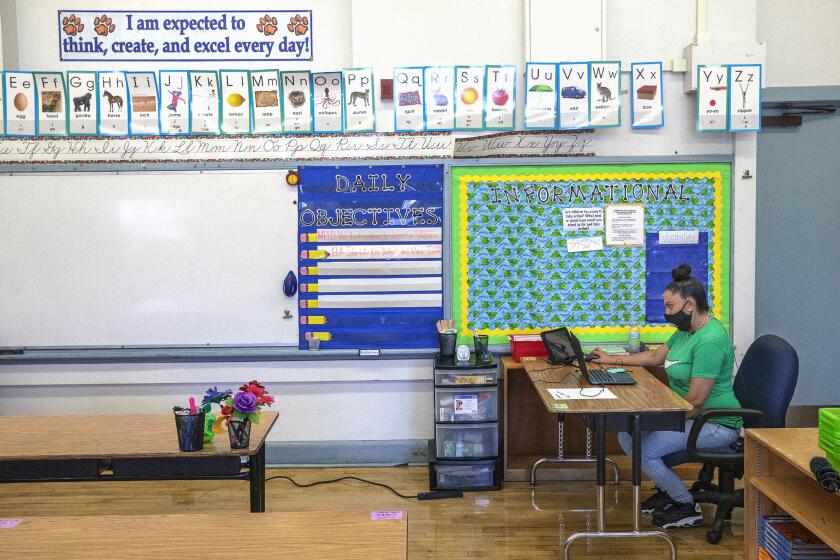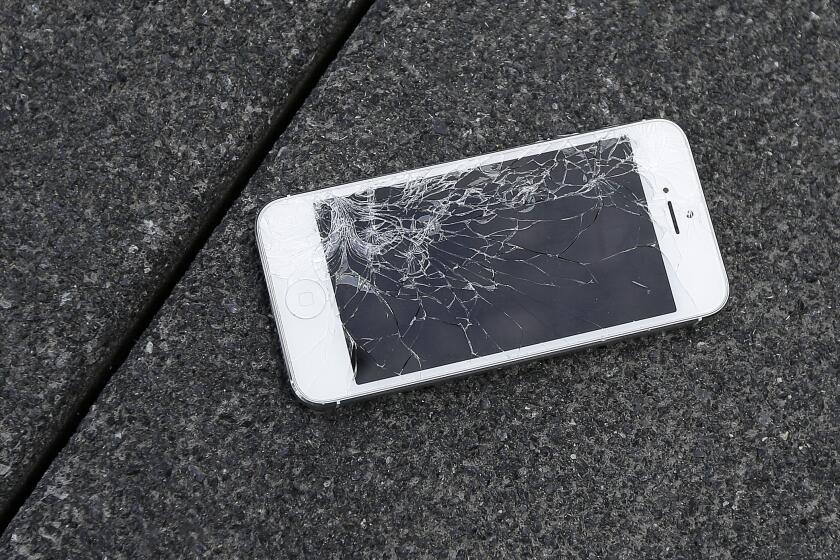Chromebooks get a boost from Google. Will longer lifespan help users?

- Share via
Google’s Chromebook has become ubiquitous in classrooms across the United States, often considered the go-to option for digital learning given its relative affordability and web-based programs — a combination that proved even more valuable for distance learning during the height of the COVID-19 pandemic.
Since Chromebooks’ launch more than a decade ago as a cheaper alternative to tablets, their use has expanded exponentially in schools nationwide, providing more students a personal computer device — including in many low-income districts. And although issues of internet connection and at-home access to devices persist, new improvements to the Chromebook could help stretch its lifetime and scope.
Google recently announced plans to expand Chromebooks’ automatic updates up to 10 years, maximizing the potential lifespan of the devices that have become key for both in-school lessons and after-school studies. Beginning next year, the change will automatically apply to all Chromebooks launched in 2021 or later, and for devices released before 2021 there will be an option to extend the updates to 10 years from the platform’s original release, Google officials said.
“I think this change is going to save a lot of laptops from getting disposed of,” said Lucas Rockett Gutterman, the director for California Public Interest Research Group’s Design to Last campaign. Gutterman worked on a report this spring called Chromebook Churn. “This update is going to give them more years of support so that they can stay in use longer.”
Gutterman and his team found that Chromebooks previously lasted an average of four years before reaching an automatic-update expiration date — a set date when software support and critical security checks end. For many schools, that cut off access to certain secure websites and applications, including critical state testing, Gutterman said.
A rural California school district scrambles to find teachers amid a national shortage. It will not offer transitional kindergarten, despite a new law.
The Chromebook Churn report also found that some working devices were forced into obsolescence due to these pre-fixed expiration dates. Doubling the average lifespan of a Chromebook to eight years — without accounting for other maintenance issues, which educators say often arise — could save schools across the country $1.8 billion, or about $225 million in California, the report found. Such a change would also vastly reduce carbon emissions by minimizing unnecessary electronic waste.
“To [Google’s] credit, they listened,” Gutterman said, citing pressure from educators, parents, activists and environmental groups. He said the change could also provide the opportunity for a “secondary life” for the devices through resale, given the longer software window.
Although most educators welcome Google’s plans to boost the Chomebook’s life, some say, in practice, the change may not have much of an effect.
“I think we’ll probably keep a similar refresh cycle just because of the wear and tear we’re seeing on the devices, especially those in the take-home program,” said Scott Bennett, assistant director of technology support for the Irvine Unified School District. “They hold up a little bit better than cellphones, but realistically, I’d say six years is probably about the limit.”
What with physical damage — cracked screens, worn hinges — and diminished battery life, Bennett said he didn’t expect his district’s Chromebooks to last 10 years, even when they have the capability. Since 2015, Irvine Unified has purchased about 75,000 Chromebooks for the district, a third of which have already been taken out of circulation, either due to physical damage or that set expiration date, which hit about five or six years after purchase, he said. Of Irvine Unified’s 36,000 students in prekindergarten through 12th grade, Bennett said middle schoolers tend to be roughest with the electronics.
“God bless you if you can get that thing to last eight years,” said John Sowash, a Michigan-based educational tech consultant and former classroom teacher, who agreed that middle schoolers challenge any Chromebook’s longevity. “The thing will fall apart before the software expires.”
At Torrance Unified School District, officials are hopeful the change could benefit future Chromebooks, but it’s still unclear given how often students use the devices, said district spokesperson Sara Myers.
I had always envisioned introducing our kids to their own tech on our terms — perhaps with a shared laptop for the household. But 2020 changed the world for everyone.
“While the concept of potentially saving money and the environment could be a nice idea,” Myers said in a statement, “as a district we find that after heavy use by students, a Chromebook that is four to five years of age has already seen a lot of wear and tear.”
Others are more upbeat about the change.
Officials with the Long Beach Unified School District have distributed 180,000 Chromebooks since 2016, and the technology staff is optimistic about the extended lifetime, district spokesperson Evelyn Somoza said.
“Google’s updated Chromebook lifecycle should reduce the cost of replenishing devices over time, however, we need to see if instructional software publishers align with Chromebooks’ expanded lifecycle before determining the impact of the extended use,” Somoza said in a statement.
John Sasaki, spokesperson for the Oakland Unified School District, said the extension to 10 years would ensure that no good, working device would need to be retired early due to planned expiration dates.
Exactly how many Chromebooks are in use across California schools isn’t clear, but researchers found that the Google product made up the largest share of mobile PC shipments for K-12 learning in 2022 across the globe, according to Futuresource Consulting, a U.K.-based market research firm.
“Being able to afford a device for every student has really democratized the classroom,” Sowash said. “If Google wants to extend it 10 years, 20 years, we’ll take whatever — it’s a great option.”
But he said that, given how fast technology changes — now with artificial intelligence and increasing interest in video — the desire for increased power and storage is higher than ever. Google’s latest announcement about planned updates doesn’t include many changes to the hardware or storage, but will include new energy-saving features to improve battery life, the company said. Google also plans to simplify repairs for Chromebook software issues, expediting that process.
Gutterman said he hopes these changes from Google will also spur improvements from the hardware companies that manufacture Chromebooks, such as Dell, HP and Lenovo. He said he’d like to see the companies standardize more parts and provide replacements, which would also allow for easier and cheaper repairs when things inevitably break.
Column: Californians deserve the right to repair their electronics — even if Big Tech hates it
A state bill would require device manufacturers to make it easier for consumers to get their gadgets fixed. It has strong support from voters — but not tech companies.
“We’re hoping that Google can continue to work with us and push on the manufacturers to really have devices that are physically designed to last longer as well,” Gutterman said. “But software is a good start, for sure.”
Norma Chavez, an active Parent Teacher Student Assn. member at her daughter’s Sun Valley middle school, said she’s still thankful for the Chromebook her daughter received last year through the Los Angeles Unified School District, and hopes it lasts for years to come.
“First of all, because it’s less technology thrown in the trash,” Chavez said, who serves as the president of the Valley Hills Council PTSA. She said it also provides continuity for students and reduces spending in a district that continues to have to monitor a tight budget.
“I learned how much money it costs to provide these services for the students,” she said, “so I value that.”
And for educators, it’s been transformational to have such devices for all students.
“The focus is always about getting tech in the hands of kids,” Bennett said. “Chromebooks did a fantastic job getting the price point to a point where that was scalable. ... We worked really hard to ensure that equity.”
More to Read
Sign up for Essential California
The most important California stories and recommendations in your inbox every morning.
You may occasionally receive promotional content from the Los Angeles Times.

















